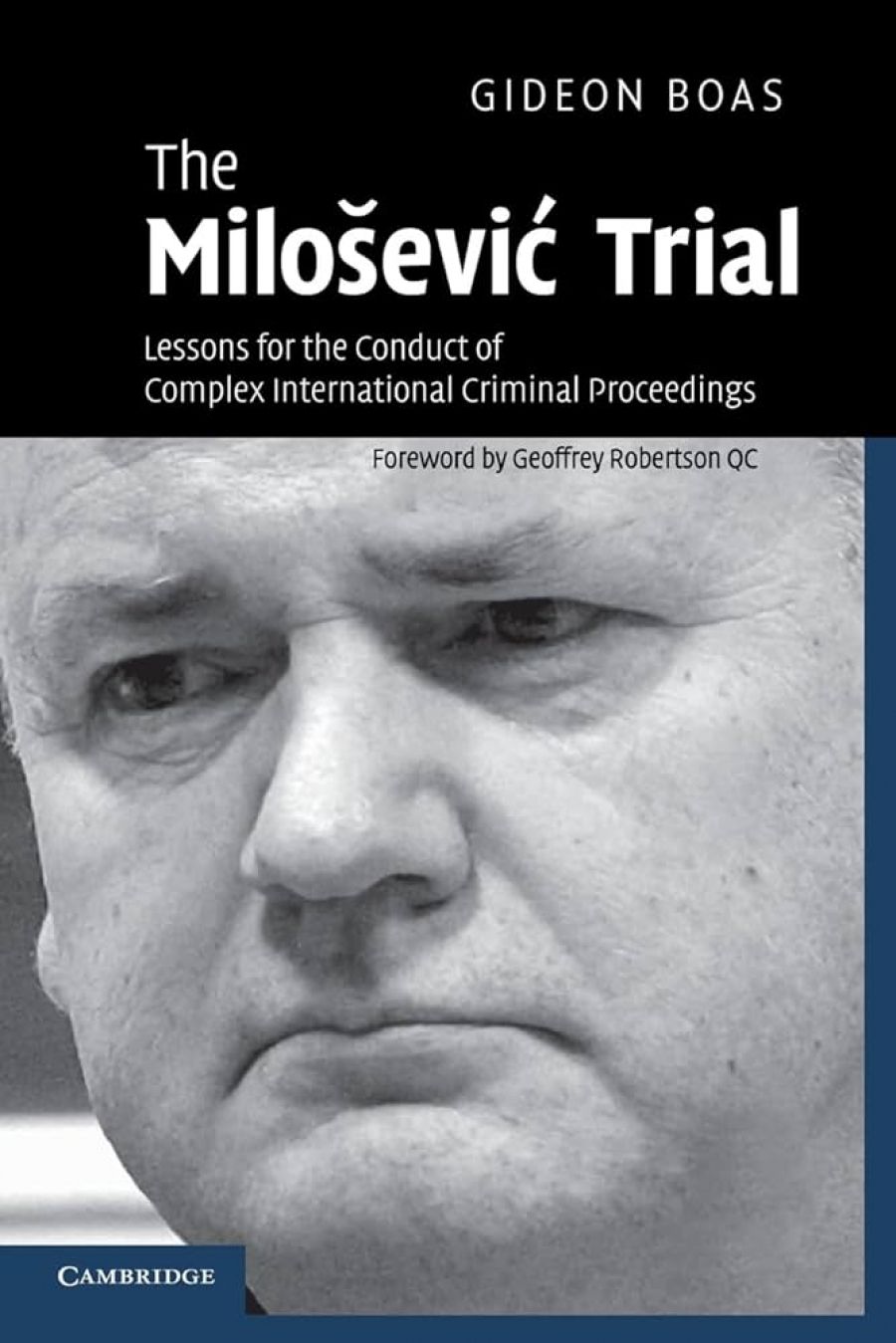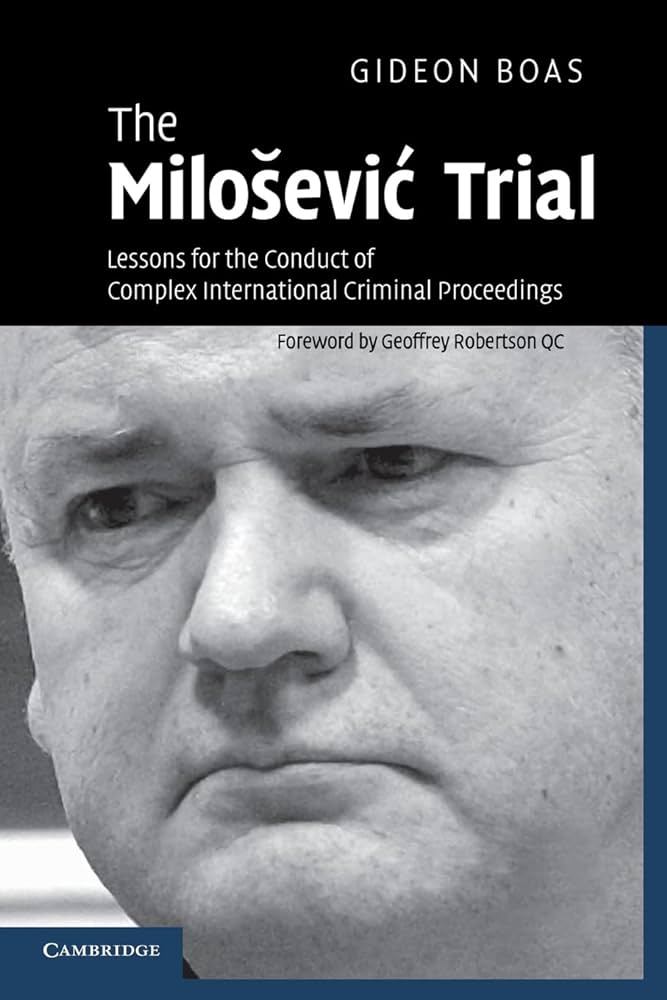
- Free Article: No
- Contents Category: Non-fiction
- Custom Article Title: Struggle against imputiny
- Review Article: Yes
- Article Title: Struggle against imputiny
- Online Only: No
- Custom Highlight Text:
At the time of his death in March 2006, Slobodan Milošević had been on trial at the International Criminal Tribunal for the former Yugoslavia (the ICTY) for more than four years. Greeted initially as a victory in the ‘struggle against impunity’, the progress of his trial was soon hindered by thickets of procedural argument and by the cunning of Milošević himself. Diverting attention from events in Croatia, Bosnia and Kosovo – the subject of his trial – Milošević manipulated every legal avenue available to him, giving the impression that, like the farcical and chaotic litigation in William Gaddis’s A Frolic of his Own (1994), the trial was meaningless, ultimately ‘about itself’.
- Book 1 Title: The Milošević Trial
- Book 1 Subtitle: Lessons for the conduct of complex international criminal proceedings
- Book 1 Biblio: CUP, $79.95 pb, 324 pp
- Book 1 Cover Small (400 x 600):

- Book 1 Cover (800 x 1200):

The Statute of the ICTY states that a trial must be ‘fair and expeditious’, and at the heart of Boas’s book is a consideration of how to protect an accused’s right to a fair trial while keeping complex criminal proceedings within acceptable limits. In his first chapter, Boas shows that fairness and expedition are importantly complementary values – essential to the rights of the accused and to the legitimacy of international criminal law – that nevertheless must be weighed on a case-by-case basis. ‘Fairness’ is a notoriously elusive concept in international criminal law, but Boas provides a methodical discussion of the elements necessary to ensure a fair trial. Notably, he questions whether the fundamental right of an accused to confront witnesses has been watered down by certain rules of evidence which permit a Trial Chamber to receive written evidence in lieu of oral testimony, and to admit ‘adjudicated facts’ from previously decided cases.
Boas suggests that the prompt conclusion of trials ‘has been something of an obsession of the ICTY’. The Tribunal has been ordered by the United Nations Security Council to finish its work by 2010, but its so-called ‘completion strategy’ – which encourages greater use of written evidence, the taking of judicial notice of adjudicated facts, and the referral of ‘lower-level’ cases to local courts in the countries of the former Yugoslavia – has potentially compromised fairness at the expense of expedition. As he notes, the pressures on the ICTY rapidly to conclude all its important work while maintaining judicial independence are considerable, and unease has been expressed by respected judges.
Hannah Arendt famously argued that the defects of the trial of Adolf Eichmann stemmed from the prosecution’s focus on documenting Jewish suffering under Nazism at the expense of carrying out a criminal trial. The attempt to load the proceedings with historical resonance distorted the true purpose of trying Eichmann: ‘to weigh the charges brought against the accused, to render judgment, and to mete out due punishment.’ Boas argues that the Milošević trial was similarly afflicted by the Prosecution’s attempt to assemble the history of the Balkan wars, apparently out of a sense of the trial’s historical magnitude and responsibility towards the victims of the conflicts.
The Prosecution’s case was enormously expansive and, Boas suggests, reactive rather than calculated. It issued three indictments against Milošević, spanning three conflicts over eight years and containing more than one thousand allegations. The Prosecution later requested that the three indictments be joined to form a single indictment, on the basis that the three conflicts at issue were linked by what it alleged was Milošević’s nationalist plan for a ‘greater Serbia’, and because it saw a single trial against Milošević as an important element in the effort towards reconciliation in the countries of the former Yugoslavia. But as Boas shows, the Prosecution’s strategy did not always follow its own theories; in its opening statement, it alleged that Milošević was motivated by the aggrandisement of power rather than nationalist ideology. It would have been preferable for the Prosecution to plead and argue its case with greater preparation and a more coherent focus. Unfortunately for the length of the trial, ‘the unclear articulation of the idea of a greater Serbia was relied upon to achieve joinder of the three indictments before the Appeals Chamber, and may have left Milošević as confused as the Trial Chamber about its application to the accused.’
Turning to a close examination of the form of the indictments, Boas suggests that there were serious deficiencies in the Prosecution’s pleadings. Perhaps the most striking was the indictment relating to events in Kosovo, which failed to plead material facts relevant to the different forms of criminal responsibility alleged, amongst other defects. Had the trial been completed, Boas suggests that the deficiencies may have led to acquittals on certain charges, or even to Milošević’s acquittal overall. Milošević himself never challenged the Kosovo Indictment, and the Trial Chamber did not have the opportunity to determine whether it needed to be amended, but Boas suggests that, in a complex case such as the Milošević trial, especially when the accused is representing him or herself, there exist strong reasons for a court to intervene to order the correction of a defective indictment.
Boas then offers a comparative survey of various case management practices in civil and common law jurisdictions, and considers the ways in which the Trial Chamber sought to manage the proceedings during Milošević’s trial. Arguably, the most radical option contemplated by the Trial Chamber was whether to sever the Kosovo Indictment, which would have concluded that part of the trial in 2005. The Trial Chamber ultimately decided not to sever, perhaps influenced by the strong opposition expressed by both the Prosecution and Milošević. In hindsight, it is difficult not to see the Trial Chamber’s decision as a missed opportunity to issue judgment on a considerable portion of the trial. Boas suggests that, as the body of international criminal procedure develops, trial chambers must demonstrate more authority over the course of proceedings and be less reluctant to sanction parties for non-compliance.
Milošević prepared his own defence to charges of war crimes, crimes against humanity, and genocide, and refused to accept legal counsel, despite the toll self-representation took on his health and the length of the trial. To accommodate his needs, he was given two cells at the ICTY Detention Unit, one of which he converted into an office. Milošević – who received a law degree at the University of Belgrade – prepared meticulously; his examination of witnesses was ruthless and often highly structured. Sitting in the clinical surroundings of Courtroom One at the ICTY, Milošević seemed in command, contemptuous of the judges and prosecuting counsel. He frequently wore a red, white and blue striped tie – the colours of the Serbian flag – as a demonstration of his unshakeable patriotism, posing as the victim of a supposed NATO plot.
Should Milošević have been allowed to represent himself? Despite the considerable resources at his disposal, he frequently complained that the Tribunal was not sufficiently attentive to his needs, taking too long to photocopy and translate documents he required for examining witnesses. At times, his intimidation of witnesses, his refusal to adhere to courtroom etiquette and his unstable health threatened to derail the proceedings entirely. The Appeals Chamber decided that Milošević had the right to self-representation, which reversed a Trial Chamber decision imposing court-appointed counsel. Boas is highly critical of the Appeals Chamber’s approach, and suggests – correctly, in my view – that in some circumstances the imposition of counsel is the only viable response to an accused who threatens to undermine a trial. Allowing an unqualified right to self-representation may delay or disrupt proceedings to such an extent as to make them unmanageable.
Boas’s account will surely stand as the most exhaustive analysis of the many procedural complexities of the Milošević trial. His study is a product of considerable scholarship and experience, and distils important lessons for the conduct of future international criminal trials, particularly those involving obstructionist defendants keen to grandstand or politicise proceedings. It is to be hoped that those involved in the trial of Charles Taylor at The Hague pay careful attention.


Comments powered by CComment